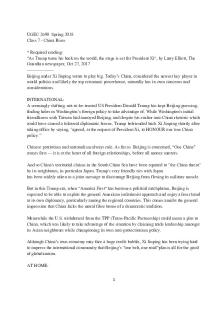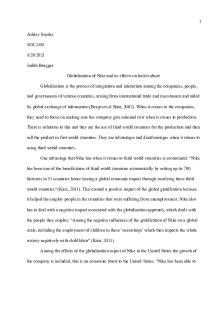UGEC 2690 Lecture 9 - Globalization and its politics PDF

| Title | UGEC 2690 Lecture 9 - Globalization and its politics |
|---|---|
| Course | Politics and Current Affairs |
| Institution | 香港中文大學 |
| Pages | 2 |
| File Size | 89.9 KB |
| File Type | |
| Total Downloads | 260 |
| Total Views | 659 |
Summary
UGEC 2690 – Spring, 2018 Class 9 Globalization and its politics Required reading: <40 years of data suggests 3 myths about globalization>, by Lucas Chancel, Harvard Business Review hbr, Mar 2, 2018 Globalization -> GloCalization "Globaliz...
Description
UGEC 2690 – Spring, 2018 Class 9 Globalization and its politics Required reading: , by Lucas Chancel, Harvard Business Review hbr.org, Mar 2, 2018
Globalization -> GloCalization
"Globalization-bashing" is a new trend around the world, and has been dubbed a continuing fight of nationalists Vs globalists.
Shall a country OPEN up to the rest of the world but harm its own interests, or shall it CLOSE for protectionism and defend its own people's livelihood, and perhaps also its very own ideology? Brexit in the UK and the Trump presidential victory in the US have heightened the debate.
When it first started in the 1990's, the term globalization generally means global, all-round free trade. But it also carries controversial political, social, cultural and even racial connotations. In a broad sense, globalization equals internationalization. 1. The idea PRO’S: A global village, free flow of trade, technology and information. Say “no” to protectionism. China's joining the WTO is a good example of the globalization process.
CON’S: Globalization can mean standardization. Some would call it Americanization – see how McDonald's, Coca Cola and Hollywood movies dominate world consumer cultures. The rich get even more overpowering, the poor further exploited. The wealth divide becomes even wider. Part of the world such as Africa remains largely left out. MIDDLE-OF-ROAD APPROACH: Like it or not, globalization’s here to stay. And it has indeed been happening since civilization began. The globalization of tea is an illustrative example. Tea was originally unique only to China, India and Ceylon (now Sri Lanka), but has become universal with or without the label of globalization. -------------------------------------------------2. The trend: i/ Thanks to cheaper technology (the Internet) and cheaper transport (low airfares), global transactions of all sorts are now being conducted much faster and smoother. The development is unstoppable.
ii/ Some suggest that one way out is GLOCALISATION (Global + Localisation) => A society gets globalized without losing its own local identity and colours. iii/ But globalization = free trade = capitalism = capitalist evils = predatory pricing and unfair practices. Therefore in the process we must help ensure there are reasonable checks and balances, and that at least the TRICKLE DOWN (滴漏效應) effect takes place. Latest reports, as stated in the required reading piece, suggest that “the top 1% income share rose from 7% to 22% in India, and 6% to 14% in China between 1980 and 2016.”
3. We need fair competition laws, against – - predatory pricing (掠奪式價格) - price rigging (商議價格) - hoarding (囤貨) - bundling of sales/services (綑綁式經營) In the US, there was the federal government Vs Bill Gates case, and in Australia, the government would take flag-carrier Qantas to court for predatory pricing against “outsider” Virgin. 4. Globalization also spreads universal values, thoughts, and the sharing of languages. English, formerly considered a colonial tongue, is now taken as a global language. Chinese and HK Cantonese surely contain a long list of words originated from English, while the Oxford dictionary has included new English words of Chinese background, including “guanxi” and “danwei”. -------------------------------------------------5. THE HK SCENE: - HK. “Asia’s World City”. Oligopoly (寡頭壟斷), also with a Mainland Chinese touch. Land monopoly and ‘developer hegemony”(地產霸權). Cronyism (朋黨主義. Best example Cyber Port). Super tycoons. Mega-markets. Our free market now has in recent years fallen prey to “red” capital and HK is likely to become more economically dependent on the Mainland. - Chief Executive Carrie Lam has inherited the obvious official policy of mixing internationalisation (e.g. Disney) with nationalisation (e.g. patriotic education). Many would criticize HK, an international, cosmopolitan metropolis, for having its policies practiced still like “feudalism within a walled village”. Favouritism 「親疏有 別」, cronyism and the motto “Greed is good” are seen as rampant. - A global belief is “people power”, equated to liberty and democracy. HK's political system highlights an executive-led administration with constitutional power without the people's mandate, and a legislature that has the people's votes without true representation. This goes against the global trend of allowing political development to advance along with economic, social and ideological changes in a society....
Similar Free PDFs

UGEC 2690 Lecture 6 - HK & China
- 2 Pages
Popular Institutions
- Tinajero National High School - Annex
- Politeknik Caltex Riau
- Yokohama City University
- SGT University
- University of Al-Qadisiyah
- Divine Word College of Vigan
- Techniek College Rotterdam
- Universidade de Santiago
- Universiti Teknologi MARA Cawangan Johor Kampus Pasir Gudang
- Poltekkes Kemenkes Yogyakarta
- Baguio City National High School
- Colegio san marcos
- preparatoria uno
- Centro de Bachillerato Tecnológico Industrial y de Servicios No. 107
- Dalian Maritime University
- Quang Trung Secondary School
- Colegio Tecnológico en Informática
- Corporación Regional de Educación Superior
- Grupo CEDVA
- Dar Al Uloom University
- Centro de Estudios Preuniversitarios de la Universidad Nacional de Ingeniería
- 上智大学
- Aakash International School, Nuna Majara
- San Felipe Neri Catholic School
- Kang Chiao International School - New Taipei City
- Misamis Occidental National High School
- Institución Educativa Escuela Normal Juan Ladrilleros
- Kolehiyo ng Pantukan
- Batanes State College
- Instituto Continental
- Sekolah Menengah Kejuruan Kesehatan Kaltara (Tarakan)
- Colegio de La Inmaculada Concepcion - Cebu














